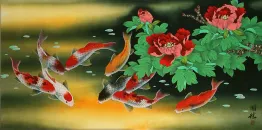Many custom options...
And formats...

Brief and to the Point in Chinese / Japanese...
Buy a Brief and to the Point calligraphy wall scroll here!
Personalize your custom “Brief and to the Point” project by clicking the button next to your favorite “Brief and to the Point” title below...
Brief and to the Point
Speak simply, while expressing your idea completely
言簡意賅 is a Chinese proverb that suggests it is better to be brief and use fewer words while still expressing your main point or idea.
In another way to explain this, one should not use 100 words when 50 will do, or being more concise with your speech.
This can also be translated as concise, compendious, “brief in form but comprehensive in scope” or succinct.
This is a bit more positive than our other proverb for brevity.
Brevity: Fewer Words are Best
Getting to the point quickly with the fewest words possible is the suggestion of this 少說為佳 Chinese proverb.
But taking it more profound, there is a warning that using too many words may act to “tip your hat” or “show your hand” (to use two American idioms).
It can also be said that using many words does not make the message have more value.
This is really about the art of brevity.
My only hope is that I did not use too many words to explain this proverb.
This in-stock artwork might be what you are looking for, and ships right away...
Not the results for Brief and to the Point that you were looking for?
Below are some entries from our dictionary that may match your Brief and to the Point search...
| Characters If shown, 2nd row is Simp. Chinese |
Pronunciation Romanization |
Simple Dictionary Definition |
短 see styles |
duǎn duan3 tuan iyama いやま |
short; brief; to lack; weak point; fault (pref,suf) short; brief; (personal name) Iyama short |
簡明扼要 简明扼要 see styles |
jiǎn míng è yào jian3 ming2 e4 yao4 chien ming o yao |
brief and to the point (idiom); succinct |
簡にして要を得る see styles |
kannishiteyouoeru / kannishiteyooeru かんにしてようをえる |
(exp,v1) to be brief and to the point; to be succinct |
The following table may be helpful for those studying Chinese or Japanese...
| Title | Characters | Romaji (Romanized Japanese) | Various forms of Romanized Chinese | |
| Brief and to the Point | 言簡意賅 言简意赅 | yán jiǎn yì gāi yan2 jian3 yi4 gai1 yan jian yi gai yanjianyigai | yen chien i kai yenchienikai |
|
| Brevity: Fewer Words are Best | 少說為佳 少说为佳 | shǎo shuō wéi jiā shao3 shuo1 wei2 jia1 shao shuo wei jia shaoshuoweijia | shao shuo wei chia shaoshuoweichia |
|
| In some entries above you will see that characters have different versions above and below a line. In these cases, the characters above the line are Traditional Chinese, while the ones below are Simplified Chinese. | ||||
Successful Chinese Character and Japanese Kanji calligraphy searches within the last few hours...






